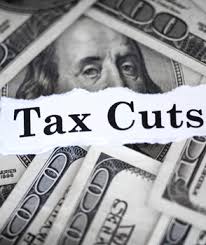Will Companies Compete Away the Tax Cut’s Bounty?

Amid the euphoria over tax reform from CEOs and Wall Street, virtually no one is asking a sobering question: Will competition between businesses erode or erase the early benefits from the steep reduction in the corporate tax rate? After all, taxes are another expense, just as labor and interest are expenses. And no one’s getting special treatment. The new levy of 21%–-a 14 point reduction from the old rate of 35%––applies equally to all U.S. companies.
So if fierce rivals are getting the same or similar breaks on one of their biggest costs, will those breaks translate into loads of extra profits, as widely expected? Or will competition spur a race to lower prices, hire new workers, and raise spending, on say, advertising or service, as stalwarts race to keep existing customers and lure new ones?
To explore the issue, this reporter sought the perspective of one of America’s leading economists, John Cochrane of the conservative-leaning Hoover Institution. In a return email and subsequent interview by phone, Cochrane described a probable outcome that’s a lot more nuanced than the view that corporate America will reach new peaks of profitability. Put simply, his prediction is that tax cuts will bring widespread benefits to the economy, and that those benefits will delivered courtesy of strong competition.
Cochrane began by identifying who really pays corporate taxes. “Corporations don’t pay taxes,” he says. “They collect taxes. Every cent comes from employees in the form of lower wages, from consumers in the form of higher prices, and from shareholders, from folks’ pension plans, in the form of lower returns. The idea that you’re really taxing something called ‘big corporations’ is absurd.”
Cochrane notes that many enterprises are taking big, widely-reported, one-time hits to earnings in the fourth quarter of 2017. (The chief cause of those charges: The new law’s requirement that multinationals immediately book a “repatriation tax” on profits that accumulated for years, free of U.S. tax, in foreign subsidiaries.) “What really matters isn’t the initial charges,” he says, “but the way the tax law changes incentives by lowering the tax rate on future earnings.” Allowing companies to keep a lot more of their after-tax profits swells the benefits of new investments. “Companies will say, ‘We’ll try new things,’” says Cochrane. “Managers will run spreadsheets showing how much an investment will earn at a 21% rate versus the old 35%, and a lot more investments will look profitable.”
As a result, the tax law will encourage companies to build new plants, fund research, and pursue acquisitions, according to Cochrane. “But as companies expand, they will drive up wages––there are only so many workers out there,” he says. “They’ll also drive down prices, and in the process, drive down profits. In the end, companies only pay shareholders a competitive rate of return, just as they only pay bondholders a market rate of return.”
In Cochrane’s view, competition will ensure that returns on capital “go back to where they were before.” The surge in investment, however, will bestow major benefits. “The economy will be larger than it would have been and wages will be higher,” says Cochrane, who further predicts that “total corporate profits will also be higher and the stock market’s total value will be greater.” His analysis doesn’t suggest that the stock prices of individual companies will perform better than in the pre-reform days. The reason: Companies will back their expansion plans with lots of new capital, and competition will ensure that returns on that new capital retreat to normal levels, as once again, rising wages and falling prices erode the initially rich gains.
A Travesty That Enriches Only the Shareholders, and Mostly the Rich at That?
Of course, opponents of corporate tax cuts insist that they’re mainly a gift to the rich. They predict that the windfall from repatriated profits, and the extra cash from lower rates, will go to buybacks and dividends, not new investments that spur the economy and create jobs. The rub, according to many of the bill’s opponents, including former Treasury Secretary Larry Summers, is that the U.S. economy suffers from a dearth of real competition. In their view, U.S. enterprises enjoy so much pricing power that they’ll keep, not compete away, the extra earnings. From their perspective, it’s the shareholder class and corporate chieftains, not workers and consumers, who will the reap the bounty.
Cochrane rebuts the bill’s detractors. “I see lots of competition and vibrancy,” he says. “Uber disrupted the taxi monopoly. Amazon is poised to disrupt healthcare. Facebook and Google are supposed to be monopolies, but I remember when Yahoo! and Netscape were supposed to be monopolies.”
For Cochrane, the tax reform opens a new frontier not for the profitability of individual players, but for the U.S. economy to expand. For this reporter, the jubilation over tax reform needs to be tempered by balanced analysis––and the best analysis comes from John Cochrane.










